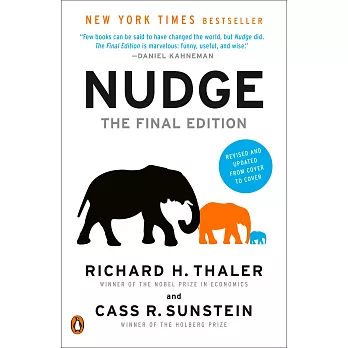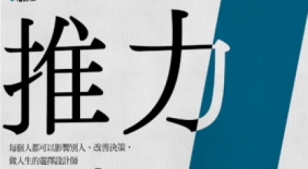諾貝爾經濟學獎得主理查.塞勒、《雜訊:人類判斷的缺陷》共同作者凱斯.桑思坦,聯手合著。
《推出你的影響力》出版超過十年後,理查.塞勒與凱斯.桑思坦融合他們這些年在政府機構內、外的經驗,以及最新研究資料,重新修訂本書,並針對包含新冠肺炎、個人理財、退休儲蓄、氣候變遷、阻止我們達成目標的「繁瑣工作」等主題,增添全新資訊。在這部增修版中,作者延續原版風趣的行文風格,為我們在日常生活中會遇到的眾多議題,提供了豐富的新見解。
-----------------------------------------------
輕輕一推就能改變人心的神奇力量!
說服不必聲嘶力竭,改革無須劍拔弩張
所有工作者、教師與為人父母者都需要的一本書
我們每天生活在各種決策之中,從一般日常事務到國家的重大政策方向,都是一連串的選擇或被選擇——既深受影響,也時時刻刻在影響他人。
但這一切的選擇或被選擇並不全然是有意識、有自覺的,人類天性上的缺陷,經常使人們在做決定時有些被動、不夠深思熟慮,傾向於採用經驗法則(預設值),且通常不去思考同一問題若換個方式陳述,自己是否也會有不同的答案。
幸好,人們還是可以試著以有效的心理學方法避免上述不甚理性的決策行為,並為自己或他人做出更好的選擇。本書兩位作者塞勒與桑思坦擁有深厚的行為經濟學背景,並以過去四十年來社會科學的審慎研究結果為基礎,提出在心理學上已被證實有效的全新思維——「推力」(Nudge)。
只要創造出適當的決策環境,就能促使人們自動做出較好的決定。不需要強迫、硬性規定,更不必妨礙任何人的選擇自由,自然會形成一股「推力」,把人事物推往你期望的方向——這一切端看你如何扮演「選擇設計師」(choice architect)的角色。
事實上,我們可能早已在扮演選擇設計師的角色而不自知。你可能是醫生,必須為患者分析各種療法之優劣;你可能是老師,必須設計出能激起學生熱情的教案;身為主管,你得想出能讓員工全力以赴的薪酬獎勵方案;或者你是員工,必須說服老闆接受你的提案;你也可能為人父母,要想辦法讓孩子願意早點入睡、多吃點健康的食物——這些都涉及個人的意願,取決於你如何陳述問題,讓對方心甘情願選擇你期望的、且確實能帶來最佳結果的選項。
要讓每件事都朝我們期望的方向前進通常十分費力,要說服所有人從來就不是件容易的事。但只要學會運用「推力」,透過聰明的選擇設計,說服他人再也不必聲嘶力竭、意見不合也無須劍拔駑張,人人都可以在關鍵時刻推出不同以往的影響力!
(中文簡介來自時報出版《推出你的影響力:每個人都可以影響別人、改善決策,做人生的選擇設計師》書籍介紹)
An essential new edition―revised and updated from cover to cover―of one of the most important books of the last two decades, by Nobel Prize winner Richard H. Thaler and Cass R. Sunstein
* More than 1.5 million copies sold
* New York Times bestseller
Since the original publication of Nudge more than a decade ago, the title has entered the vocabulary of businesspeople, policy makers, engaged citizens, and consumers everywhere. The book has given rise to more than 400 “nudge units” in governments around the world and countless groups of behavioral scientists in every part of the economy. It has taught us how to use thoughtful “choice architecture”—a concept the authors invented—to help us make better decisions for ourselves, our families, and our society.
Now, the authors have rewritten the book from cover to cover, making use of their experiences in and out of government over the past dozen years as well as an explosion of new research in numerous academic disciplines. To commit themselves to never undertaking this daunting task again, they are calling this the “final edition.” It offers a wealth of new insights, for both its avowed fans and newcomers to the field, about a wide variety of issues that we face in our daily lives—COVID-19, health, personal finance, retirement savings, credit card debt, home mortgages, medical care, organ donation, climate change, and “sludge” (paperwork and other nuisances we don’t want, and that keep us from getting what we do want)—all while honoring one of the cardinal rules of nudging: make it fun!



 天天爆殺
天天爆殺  今日66折
今日66折 

























 博客來
博客來 博客來
博客來 博客來
博客來 博客來
博客來 博客來
博客來